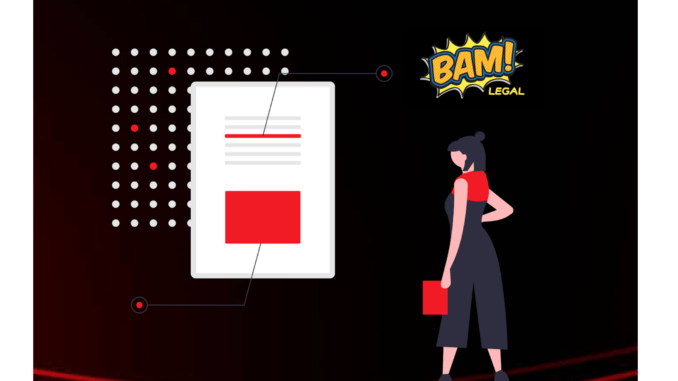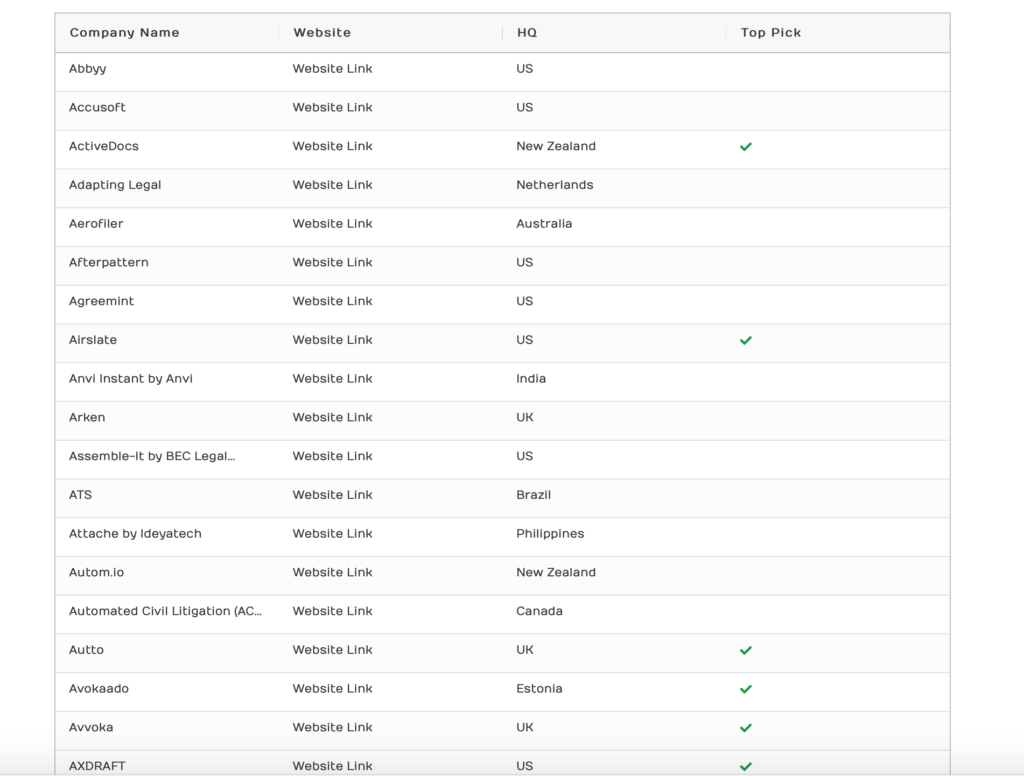
Catherine Bamford, the well-known legal engineer, has launched a free resource called the Doc Auto Database that lists 250 providers of document automation software to help lawyers navigate the field.
The database is part of the Bam Legal consulting site and it’s incredible to think that there are so many companies offering variations of basically the same end result. Although, that said, some take quite different approaches to getting to that result, from no-code graphical interface systems that can be used for many other tasks, to CLM systems that have this as part of their offering, to very niche point solutions that only do doc automation.

Bam Legal is a consultancy that provides clients help with doc automation tasks, but it’s a very useful resource all the same. Bamford has also added a taxonomy to help break down some of the key aspects of the companies, e.g. showing pricing models and key differentiators.
Although there are dozens of companies that can be searched for in the database, there are also ‘Top Picks’ across several categories, such as: Doc Automation in general; Contract Lifecycle Capabilties; and Process Automation Capabilities.
Bamford told Artificial Lawyer: ‘We get approached all the time by law firms and inhouse teams asking which document automation tool they should buy and our answer is always that there is no ‘one size fits all’.
‘It depends very much on their use case, who their users are, and what types of documents they want to automate. To help, my team and I have created this free site to help everyone choose which document automation software is right for them.’
She added that the companies do not pay to be listed, although it’s clear that certain companies are a bit more favoured than others via the ‘Top Picks’ section, which is to be expected given Bamford’s long experience in this area.
The move comes as more and more legal tech listings appear. Even this site has one that launched back in 2017, the AL 100 legal tech directory, and which helped to inform this new one. And even US law firm, Orrick, has created a detailed directory called the Observatory. In their case it shows around 70 companies that offer doc automation.
The challenge for the potential buyers is breaking through the sheer amount of information, which as this database shows for doc automation, is enormous. Few law firms have the time and resources to test out more than a small handful of providers, and testing doc automation is going to be a lot less complex than setting up accuracy tests for something like large-scale due diligence reviews, by way of comparison. As to testing out a number of CLM systems at scale before you buy, well, that is quite an ask for an inhouse legal team.
This raises bigger questions about how we all buy legal tech in the first place.
If we look at the buying behaviour in our own lives we can perhaps find a clue or two. People tend to want several things: a view of the wider market for the thing they want; recommendations from peers and friends i.e. trusted reviews from people who know more about the products than we do; and they also perhaps want input from an expert, e.g. Which magazine.
There are also plenty of other factors, such as in the absence of detailed knowledge then people will understandably check out the brands that are most well-known or appear to have a good position in the market. I.e. it’s a human instinct to be informed by brand positioning, as it often can be an indicator of real value – although only testing it out will provide the proof. E.g. we assume that a Mercedes is probably going to be better than a Kia as it has a higher brand position in the market. (But, you may not want better, you may just want good enough.)
Of course, because this is the law, issues around security, reliability and accurate operation are super important. Moreover, good support may be a factor, although that would be important in any sector.
And finally, there is price. For large commercial law firms this may not be the defining aspect, but it will always play some part. Given a choice between two seemingly identical products then price may have a clear impact.
In short, there is so much information that goes into making a choice that a database on its own is really always just a starting point, and you will probably want to talk to the vendor, see their demos, understand their thinking and approach to what they are doing, (and even explore their vision), as well as understand that company’s position in the market, including taking in expert input, before you make that choice.
Either way, this is a welcome move, and more transparency and data sharing in the legal sector can only help buyers to ultimately make more informed decisions.
1 Trackback / Pingback
Comments are closed.